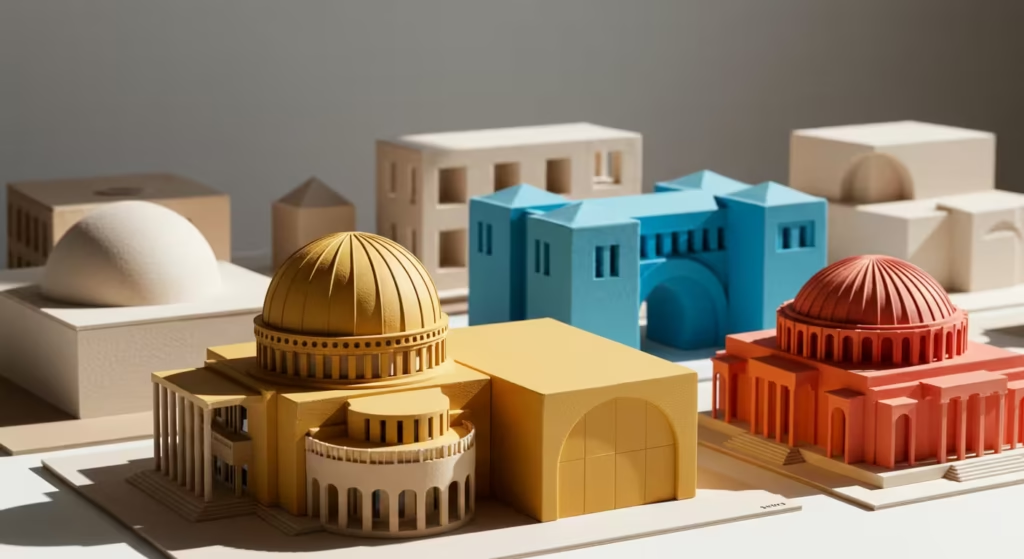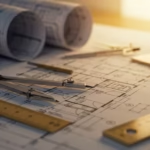Choosing the right GCSEs is one of the most important first steps if you want to become an architect in the UK. Your GCSE subjects and grades will shape the A Levels you can take, which then determine your eligibility for an accredited architecture degree. Many students worry about what GCSEs are essential, which ones are optional, and how much flexibility universities allow.
The good news is that while certain subjects like maths and English are compulsory, universities also value creativity, problem-solving, and a balanced academic profile. This guide explains the GCSE subjects you should prioritise, recommended combinations, and alternative routes if you don’t take the “perfect” mix. It also includes advice from architects and universities so you can make confident choices now that set you on the right path to a professional career in architecture.
Why GCSE Choices Matter for Aspiring Architects
GCSEs may feel like an early stage in your education, but they form the foundation for studying architecture at higher levels. Universities look at your GCSE results to check if you meet minimum requirements in maths and English, as well as to see whether you have strengths in creative or technical subjects. A solid performance at GCSE can also help balance your application later, especially when applying to competitive architecture schools.
Your GCSEs will influence which A Levels you are eligible to take, which in turn affect your entry into an architecture degree. For example, without a strong maths or science GCSE, you may struggle to take the higher-level qualifications that many universities prefer. Choosing wisely at this stage ensures you keep multiple pathways open, including the option of pursuing apprenticeships or foundation courses. In short, your GCSE decisions act as the building blocks of your architectural career, so they deserve serious thought and planning.
Essential GCSEs for Architecture

Before focusing on creative subjects, it is important to understand that certain GCSEs are considered non-negotiable for architecture. Universities expect students to achieve at least grade 4/5 or above in Maths and English, with Science also highly recommended. These subjects are the academic backbone of architecture studies. Maths builds problem-solving and analytical skills needed for structural design. English ensures clear communication, both written and spoken, which is vital for reports, presentations, and collaboration. Science, particularly Physics, supports understanding of materials, energy, and building performance.
Mathematics: Core for Design, Structure, and Problem-Solving
Mathematics is one of the most important GCSEs for anyone considering a career in architecture. Architects need to apply mathematical principles when working on measurements, scale drawings, and structural calculations. Universities expect at least a grade 5 or higher in GCSE maths to ensure you can handle the technical demands of an architecture degree. Beyond the classroom, strong numeracy skills will help you understand budgets, material quantities, and sustainability calculations.
Mathematics also supports problem-solving skills, which are essential in architectural design. Whether you are considering structural load, energy efficiency, or site dimensions, maths provides the framework for accurate decision-making. Without it, even the most creative designs may not be viable in practice.
English Language: Communication and Report Writing
English language is another essential GCSE for architecture. Architects do more than draw; they must communicate complex ideas clearly in writing, through presentations, and in meetings with clients, contractors, and planning authorities. A minimum of grade 4 or 5 in GCSE English is normally required for university entry.
Strong communication skills also help when writing project briefs, producing design reports, or defending proposals at planning applications. At every stage, architects need to explain their thinking in plain, structured language that can be understood by both professionals and the public. Good performance in GCSE English demonstrates that you can write clearly, analyse information, and express your ideas logically. These are lifelong skills for anyone in the profession.
Science (Physics Recommended): Building, Materials, and Environment
Science, and particularly physics, is strongly recommended for future architects. Physics helps you understand forces, energy, and materials, which directly apply to construction and building design. Many architecture schools prefer applicants who can demonstrate scientific reasoning alongside creative ability.
Physics at GCSE introduces concepts like strength of materials, thermal efficiency, and environmental factors, all of which are crucial in sustainable architecture. As building regulations increasingly focus on energy efficiency and safety, having a strong grounding in science ensures you can adapt to future professional demands. While not every university demands a science GCSE, it gives you a competitive edge and broadens your understanding of how architecture interacts with engineering and the natural environment.
Recommended Creative and Design-Based GCSEs

Alongside academic GCSEs, architecture schools place strong value on creative subjects that showcase artistic and design skills. The most common recommendations include Art & Design, Design & Technology, and related creative subjects. These provide the opportunity to build a visual portfolio, practice drawing, and explore design thinking—all crucial for university applications.
Art & Design: Developing Drawing and Visual Presentation Skills
Art & Design is highly valued because architecture relies heavily on visual communication. Universities expect applicants to present a portfolio, and GCSE Art provides the foundation for producing creative, well-structured visual work. A good grade here shows you can explore ideas, experiment with different media, and express creativity , all essential skills for an architect.
Many students use their GCSE Art coursework to begin developing portfolios, which later support university applications. The ability to draw and present ideas visually will remain one of your strongest assets throughout your career, from sketching early concepts to producing client-ready presentations.
Design & Technology: Linking Creativity with Practical Problem-Solving
Design & Technology complements architecture by combining creative design with practical application. This subject encourages problem-solving through projects that often mirror real-world design challenges. By studying this GCSE, you learn about materials, manufacturing processes, and design evaluation, which directly connects to architectural practice.
GCSE Design & Technology also introduces basic principles of product design and engineering, helping you see how creativity can translate into practical solutions. Universities value this subject because it shows you can work through an idea from sketch to finished model, balancing aesthetics with functionality.
Geography: Understanding Land, Urban Planning, and Sustainability
Geography provides a unique perspective on how people interact with the built and natural environment. GCSE Geography covers topics like urban development, population growth, and sustainability, all directly linked to architecture.
This subject helps you appreciate how buildings and cities function in a wider context. As modern architecture increasingly focuses on environmental impact and urban planning, geography equips you with valuable background knowledge. It also demonstrates to universities that you can think critically about issues like climate change, land use, and infrastructure.
Computer Science or IT: Digital Design and CAD Foundations
While not always required, Computer Science or IT at GCSE can be highly beneficial. Digital tools like CAD (Computer-Aided Design) and BIM (Building Information Modelling) are central to modern architecture. Early exposure to computing builds skills in logical thinking, software use, and digital presentation.
This subject strengthens your ability to work with technology, an area where architecture is rapidly developing. Universities and employers increasingly expect graduates to have confidence in using digital design tools, making Computer Science or IT a useful addition to your GCSE profile.
Best GCSE Subject Combinations for Future Architects
It’s not just individual subjects that matter, but how they work together. The ideal mix balances essential skills with creativity and technical knowledge.
| Core GCSEs (Usually Required) | Recommended Supporting GCSEs | Beneficial Extras |
| Maths | Art & Design | Computer Science / IT |
| English Language | Design & Technology | Geography |
| Science (Physics Preferred) | Additional languages |
A strong combination might include Maths, English, Physics, Art, and Design & Technology. This covers the technical, creative, and communication skills universities expect. However, if you also take subjects like Geography or Computer Science, you demonstrate broader knowledge that makes your application even stronger.
Expert Advice and Guidance on GCSEs for Architecture in the UK

Choosing the right GCSE subjects for a career in architecture can feel overwhelming. Students often worry about selecting the “perfect” mix of subjects to keep their options open for university applications. The good news is that while some GCSEs are essential, many routes can still lead into architecture, even if you don’t take all the recommended subjects straight away. This section brings together expert insights from architects, universities, and professional bodies like RIBA and ARB. It also provides practical advice for subject choices, pathways if you didn’t take the ideal GCSEs, and strategies to improve your grades. By the end, you will have clear direction on how to prepare for architecture from your GCSE stage.
Expert Advice from Architects and Universities
Architecture schools across the UK emphasize that students should build a balance between creative and academic subjects. Most universities expect passes in English, Maths, and Science as these prove core competencies. At the same time, they strongly value creative subjects such as Art & Design or Design & Technology because these help you demonstrate drawing skills, design thinking, and creativity. Admissions tutors often highlight that portfolios matter more than any single GCSE, so excelling in subjects that showcase creativity will strengthen your application.
Practicing architects also note that architecture is a career that blends design flair with technical accuracy. They recommend GCSEs that push students to think critically, solve problems, and communicate ideas clearly. Universities like UCL, Manchester School of Architecture, and Cardiff often say they look for students with curiosity, commitment, and creativity, not just perfect grades. This means that a student passionate about architecture, with a strong portfolio and enthusiasm for the subject, may still succeed even if their GCSE pathway is slightly different.
How to Choose the Right GCSEs for Architecture

Choosing GCSEs for architecture should balance academic strength with creativity. Core subjects such as Maths, English, and Science provide the foundation that all universities require, while creative options like Art & Design or Design & Technology help build the skills needed for portfolios and design tasks. The best approach is to select subjects you enjoy and can perform well in, as strong grades matter just as much as subject choice. Aim for a mix that demonstrates both analytical ability and creative thinking, since architecture is a profession that relies on both.
Pick Subjects That You Enjoy and Can Excel In
Selecting subjects you genuinely enjoy increases your chances of performing well. Universities prefer strong grades across subjects rather than weak grades in subjects chosen just for prestige. Enjoyment also leads to consistent effort, which matters in demanding courses like architecture.
Showcase Your Creativity Alongside Technical Strength
Architecture requires both creative and technical thinking. Balancing subjects such as Maths or Physics with Art & Design or Design & Technology will highlight your ability to manage both areas. This balance reflects the dual nature of architecture as both a science and an art.
Build Transferable Skills for University and Beyond
Subjects like Geography and IT can also be valuable because they build transferable skills. Geography helps with understanding the environment and sustainability, while IT supports digital design and presentation. Universities appreciate students who bring a wider perspective through their subject choices.
What If You Didn’t Take the ‘Right’ GCSEs?
Not every student chooses Art & Design or Design & Technology at GCSE level. Fortunately, this does not mean your path to architecture is closed. Universities and architecture schools often provide alternative routes. Foundation courses in Art or Design are common pathways that help students build skills and prepare portfolios for university applications.
Portfolio strength often outweighs missing GCSE subjects. A well-prepared, creative portfolio can prove your ability to design, think critically, and communicate visually. Mature students and career changers also enter architecture with different backgrounds, showing that universities value potential and passion as much as academic history.
Improving Your Grades for Architecture Applications
Strong GCSE results will make your path smoother, especially when applying for A Levels or equivalent qualifications. If you are worried about your grades, there are effective ways to improve. Study strategies such as breaking revision into small daily goals, using past exam papers, and joining study groups can make a big difference.
Resources like BBC Bitesize, GCSE revision guides, and online tutoring platforms can provide structured support. Schools often offer after-class revision sessions and one-to-one mentoring, make use of these where possible. The goal is not perfection but building a solid foundation in key subjects like Maths, English, and Science while showing your creativity in other areas.






